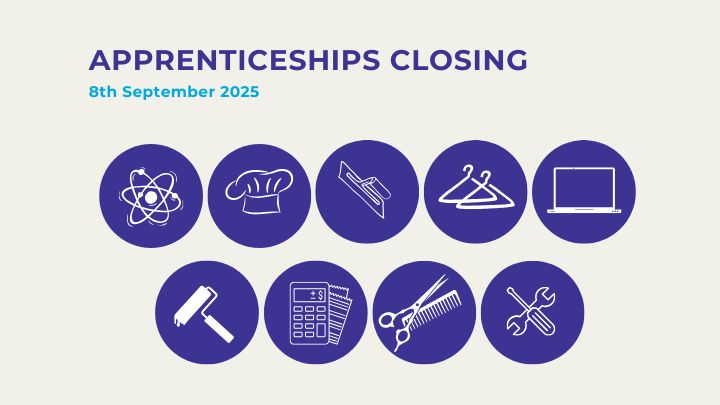In Summary
The Apprenticeship in horticulture is for anyone who wishes to pursue a career in the horticultural sector or existing personnel employed in a horticultual facility that would like to gain a recognised qualification.
This is a two-year programme with 6 streams, developed in consultation with industry.
The apprenticeship is streamed into:
- Nurseries
- Garden Centres
- Garden And Parks
- Fruit Production
- Vegetable Production
- Hard Landscaping

The apprentice must stay in their chosen stream for the duration of the programme.
As part of this programme, apprentices will engage in onthe-job training with a SOLAS approved employer. Off-thejob training will take place in a Teagasc College supported by online learning.
Off-the-job training will also include some visits to industry / horticultural research locations. Off-thejob training will be a total of 10 weeks per year. On completion of the programme, the Apprentice will hold a nationally-recognised QQI Higher Certificate as a Horticulturist (NFQ Level 6).
The apprenticeship programme is designed to be delivered in a flexible way, which includes blended learning, skills training, face to face classwork, online delivery and off the job training.
To view full details of this occupation, view information from our Careers database for the following occupation: Horticulture
Entry Requirements
To be eligible for this apprenticeship, an applicant must:

* A qualification deemed equivalent on the Irish National Framework of Qualifications to any of the qualifications listed above.
NOTE - The English language entry requirements for the programme are CEF B2+ or equivalent. Candidates with English language levels below CEF B2+ must first reach this minimum standard before enrolling on the academic programme. Where there is a mathematics requirement at Leaving Certificate Established or Vocational Programme, obtaining a minimum grade O6/H7 in Maths, mature and international applicants may be required to demonstrate that they possess the required competency through the completion of a maths assessment.
Training
Higher Certificate in Horticulture
Programme Modules
Year 1 / Stage 1
- Growing Media and Plant Nutrition
- Plant Science
- Plant Propagation
- Sustainable Plant Protection
- Plant ID
- Sustainable IT Skills
- Horticultural machinery and health and safety
Note: All streams complete year 1 modules, content and assessment tailored to the relevant stream.
Year 2 / Stage 2
Mandatory for all streams:
- Financial Management for Horticulture
- Sustainable Horticultural Practice
Note: All streams complete year 2 mandatory modules, content and assessment tailored to the relevant stream.
The following are the specific stream modules:
Fruit Stream:
- Fruit Production
Garden and Parks Stream:
- Advanced plant identification and cultivation techniques
- Garden and Parks Management
Garden Centre Stream:
- Customer Service for horticulture
- Garden Centre management
Landscaping Stream:
- Advanced plant identification and cultivation techniques
- Hard landscaping
Nursery Stream:
- Customer service for Horticulture
- Nursery stock production
Vegetable Stream:
- Vegetable production
Off-the-job co-ordination location:
- Teagasc, Botanic Gardens, Glasnevin Dublin D09VY63
Apprentices will be trained in a progressive manner and will get to put their skills into practice during both on and off the job training stages. On successful completion, the apprentice will be fully competent in the role of a Horticulturist.
Employers are asked to support employees throughout their learning journey by engaging and facilitating one - to - one mentor meetings on a regular basis. Employers will be issued with advice on this during the induction training.
The block release programme has been designed to minimise the impact of the apprentice's abscence's abscence throughout off-season. Attendance is compulsory and apprentices will attend classes, practicals, labs and field trips while off-the-job.
The following stages will be completed as part of the Horticultural Apprenticeship:
By the end of your training, you will be able to:
- Operate a range of equipment and instruments specific to the horticultural business effectively and according to standard operating procedures.
- Work safely and productively in a horticultural setting, following appropriate safety, environment, and risk checks.
- Speak knowledgably about the horticulture industry.

- Understand the basics of plant science, soil science, plant nutrition, plant propagation and plant production.
- Identify a range of plants commonly used in horticulture in Ireland.
- Understand and use technical terminology and language.
- Apply plant protection products as a trained Professional User.
- Use transferrable skills to work in another horticulture sector.
- Use specialist skills to work within an identified horticulture sector.
Skills & Qualities
As with gardeners, the work is often physical, so physical fitness will be required, but the nature of the work will help you develop the required stamina.
You will also need to be a critical thinker, comfortable with researching the fundamental aspects of plant life and applying that knowledge to the problems you face in your work.
Some project management and planning skills will be necessary, as will communication skills, so you can pass on your knowledge and contribute productively to large teams of colleagues.
Do You?
- Meet the Minimum entry requirements.
- Want a Career in Horticulture.
- Want to learn and earn at the same time.
- Have a good level of physical fitness and enjoy physical activity and work.
- Have a safety focused and enjoy working outdoors.
- Have an interest in plants, horticulture and science.
- Have good literacy, verbal and numeracy skills.
- Have the ability to plan and prepare work.
- Hold good analytical and problem solving skills.
- Have good computer skills.
- Have good hand/eye co-ordination, manual dexterity and spatial aptitude.
- Have good interpersonal skills.
- Have the ability to work independently and as part of a team.
- Take responsibility for my own learning with the continual support of Teagasc, appointed Workplace Mentor and your employer.
Work Activities
- Establish and enforce operating procedures and work standards that will ensure adequate performance and personnel safety.
- Inspect completed work to ensure conformance to specifications, standards, and contract requirements.
- Direct activities of workers who perform duties such as landscaping, cultivating lawns, or pruning trees and shrubs.
- Schedule work for crews, depending on work priorities, crew or equipment availability, or weather conditions.

- Plant or maintain vegetation through activities such as mulching, fertilising, watering, mowing, or pruning.
- Monitor project activities to ensure that instructions are followed, deadlines are met, and schedules are maintained.
- Train workers in tasks such as transplanting or pruning trees or shrubs, finishing cement, using equipment, or caring for turf.
- Provide workers with assistance in performing duties as necessary to meet deadlines.
- Inventory supplies of tools, equipment, or materials to ensure that sufficient supplies are available and items are in usable condition.
- Confer with other supervisors to coordinate work activities with those of other departments or units.
Career Progression
Horticultural graduands from Apprenticeship programs can explore their options

- Plant Producers
- Distribution and Retail
- Horticulture Therapists
- Designers
- Technical Advisors
- Scientists
- Business Development
- Entrepreneurial Roles
Further progression in learning can be developed via:
- Postgraduate courses Horticulture NFQ level 9
- Continuous professional development courses:
Learners can build on their NFQ level 6 qualificaiton towards education, skills building, and career progression.

- Progression Advanced Entry on to the Level 7 Ordinary Bachelor Degree in Horticulture at the South East Technical University
- Higher Education NFQ levels 7-8 search HEI courses
- Skillnets Agri & Food Skillsconnect Search Skillnets courses
- Springboard coversion & development courses search springboard
- Post graduate programs UCD Horiculture enterprise NFQ level 9 search post grad options
- Enterprise development search Local enterprise
- Local partnership development supports Search local partner enterprise options
Getting this Apprenticeship
To become an apprentice in Ireland you must be hired by an employer. Apprenticeship employers are formally approved by SOLAS in advance of employing apprentices.

Horticultural Apprenticeship applicant guide
To find an apprenticeship, you can search apprenticeship vacancies and a list of currently approved apprentice employers on the Apprenticeship Jobs & Employers Portal. You can search for vacancies by location, and employers in each apprenticeship.
Use this link to explore a list of approved employers by region and by apprenticeship type.
Apprentices get a formal contract of employment as part of their apprenticeship.
To find an apprenticeship, you can search apprenticeship vacancies on the Apprenticeship Jobs Page. You can search for vacancies by location and by apprenticeship.
Your local Education and Training Board may hold details of employers seeking to employ an apprentice.
This apprenticeship is managed by Teagasc – Botanic Gardens. If you are interested in a Horticulturist Apprenticeship you should make contact with Teagasc – Botanic Gardens
Marcella Phelan National Apprenticeship Programme Co-ordinator Teagasc - Curriculum & Development Standards Unit.
Tel: +353 516 44508
Email: [email protected]
National Botanic Gardens Glasnevin Dublin D09 VY63
Tel: 01 8040205
Email: [email protected]
www.teagasc.ie/education
Finding an Employer
Finding an employer or registering your interest with an official Coordinating Provider is one of the first things you need to do to start an apprenticeship.
To find an apprenticeship and secure an apprenticeship work contract you can search apprenticeship vacancies on the Apprenticeship Jobs Portal . You can search for vacancies by location and by apprenticeship type.
Your local Education and Training Board may also hold details of employers seeking to employ an apprentice.
You should also directly connect with local employers who might be interested in taking on an apprentice. It is a great idea to get a part time job with a local employer who might be more inclined to take you on as an apprentice following a successful work experience placement or a part time job contract.
Further information about this apprenticeship may be available from the following organisations on this website:
Pay & Fees
The cost of the apprenticeship is €1,375 per year of the programme. Associated costs such as travel and accommodation for the off-the-job block release is extra.












